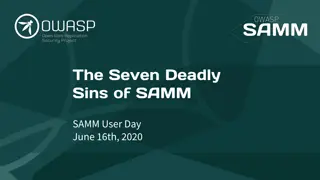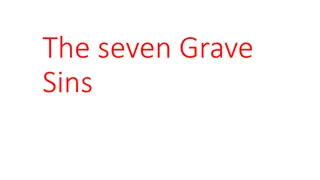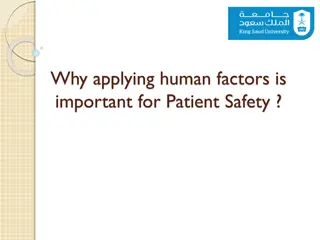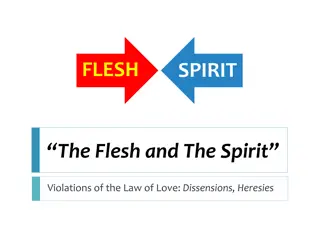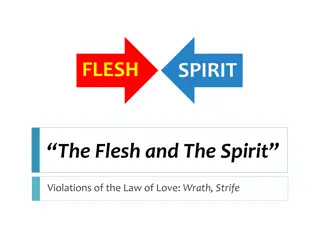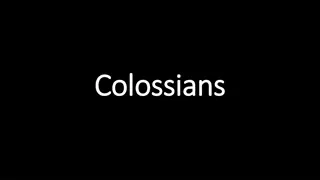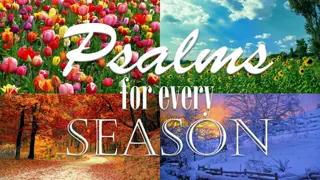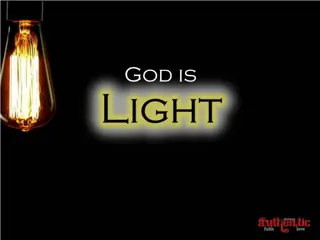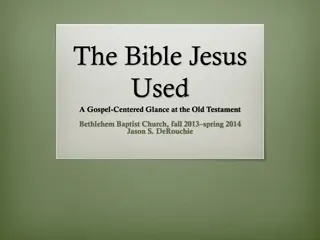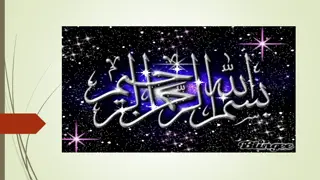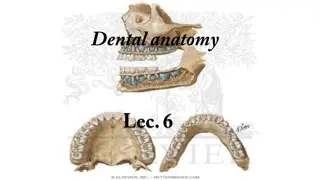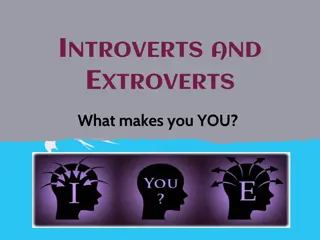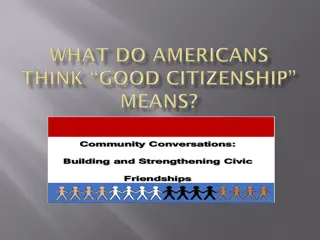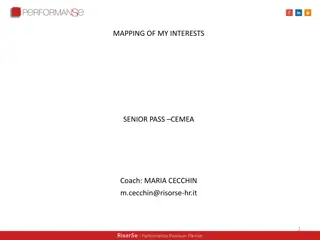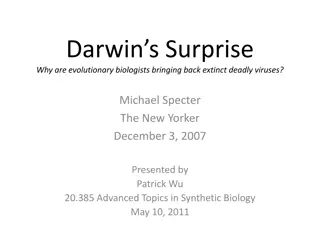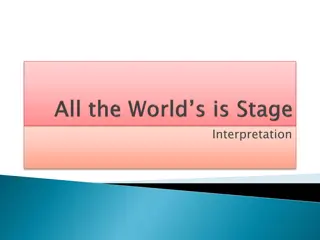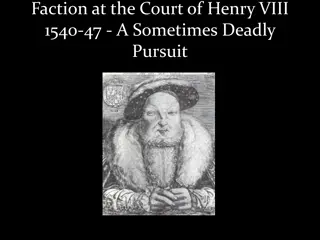Understanding the Seven Deadly Sins and Human Inclinations
Delve into the concept of the Seven Deadly Sins, their origins, and implications in human life. Explore the nature of concupiscence, the struggle against sin, and the classification of vices and virtues. Learn about the significance of wrath and the chief sources of actual sin according to the Baltimore Catechism.
Download Presentation

Please find below an Image/Link to download the presentation.
The content on the website is provided AS IS for your information and personal use only. It may not be sold, licensed, or shared on other websites without obtaining consent from the author. Download presentation by click this link. If you encounter any issues during the download, it is possible that the publisher has removed the file from their server.
E N D
Presentation Transcript
CHAPTER 7 THE SEVEN DEADLY SINS ALSO KNOWN AS THE CAPITAL SINS 2
CONCUPISCENCE CONCUPISCENCE = the human inclination toward sin and evil. A human condition which resulted from original sin. > Baptism erases original sin and turns a person back towards God but the inclination toward sin and evil stays. Therefore people must continue to struggle against concupiscence. 3
WHAT KIND OF SINS ACTUALLY CUT US OFF FROM GOD, CAUSE A BREAK IN OUR RELATIONSHIP WITH HIM AND CAUSE THE LOSS OF SANTIFYING GRACE? 5
THE SEVEN DEADLY SINS The term Seven Deadly Sins is a classification of vices that has been used since early Christian times to educate and instruct Christians about fallen humanity's tendency to sin. 6
Two Opposites A Vice is a practice or a behavior or habit generally considered immoral, depraved, or degrading in the associated society. In more minor usage, vice can refer to a fault, a negative character trait, a defect, an infirmity, or a bad or unhealthy habit (such as an addiction to smoking). It is the opposite of virtue. A Virtue is a positive trait or quality deemed to be morally good and thus is valued as a foundation of principle and good moral behavior and being. It is the opposite of vice. LUST IN HUMAN LIFE 7
THE SEVEN DEADLY SINS WHAT THE BALTIMORE CATECHISM HAS TO SAY 74. What are the chief sources of actual sin? The chief sources of actual sin are: pride, covetousness, lust, anger, gluttony, envy, and sloth, and these are commonly called capital sins. 8
What are the Seven Deadly Sins? Wrath Envy Greed Gluttony THE SEVEN DEADLY SINS Sloth Lust Pride 9
WRATH WRATH = great anger that expresses itself in a desire to punish or hurt someone or to get even with them. Wrath is anger which is acted out with violence. 10
WRATH IN HUMAN LIFE Anger which is out of control can become WRATH. Wrath is the inner desire to Get even Take revenge Settle a score Make a point Display anger & displeasure Wrath usually involves violence and acting out. Forms of wrath Domestic Violence Domination Bullying Rape 11
WRATH IN HUMAN LIFE Wrath shows itself in society as Violent crime Abuse Murder Torture Maltreatment Terrorism Wrath can cause a person to lose control or restraint. 12
VIRTUES OPPOSITE TO WRATH Calm Self-Control Kindness Patience Inner Peace These help a person to gain control and restraint. 13
GREED GREED = the extreme desire to possess wealth, goods, or things of value with the intention to keep it all for one's self. Wanting for more than what is needed for basic survival and comfort. 14
GREED IN HUMAN LIFE Greed is the inner desire to Be selfish Put yourself first Amass more than enough Be stingy and uncharitable Not share with others Greed usually involves self-centeredness. 15
A RELATED COMMANDMENT The 10th of the 10 commandments forbids us to covet. To covet is the desire to have what someone else has. It is to yearn to possess or have something or someone. 16 The Commandment includes not coveting your neighbor s spouse.
VIRTUES OPPOSITE TO GREED Generosity Giving Hospitality Benevolence Charity Love Sharing 17
SLOTH SLOTH = spiritual or emotional apathy; a neglecting of God s commands, one s duties and responsibilities, and being physically and emotionally inactive. Laziness. 18
SLOTH IN HUMAN LIFE Sloth stems from the inner desire to Do nothing Be taken care of and catered to Not take responsibility for one s self Put off fulfilling one s duties Give up and let some else do it. Let someone else do it. Sloth usually involves apathy & laziness. Forms of sloth Neglecting housework, homework, job. Skipping school or work. Skipping Mass to sleep in or do something else. 19
VIRTUES OPPOSITE TO SLOTH Activity Productivity Liveliness Vigor Energy 20
PRIDE PRIDE = an inwardly directed inflated or exaggerated sense of one's personal status or accomplishments. Thinking you are better than everyone else. 21
PRIDE IN HUMAN LIFE Pride is the inner desire to Be noticed Be the center of attention Have an over-inflated self-image Hide all one s faults and flaws Appear to be perfect Be conceited Pride usually involves self-centeredness. 22
FORMS OF PRIDE Conceit Boastfulness Self-centeredness Exclusivity Showiness Center of Attention Feelings of Superiority 23
FORMS OF PRIDE The negative form of pride is sinful self-centeredness and an over-inflated estimation of one s own importance. But there is a positive side of pride. Pride is good when it leads a person to know their own self- worth. It is an understanding that it is worth taking care of yourself; physically, emotionally, academically, socially & spiritually. When we have pride in ourselves we take care of ourselves. 24
VIRTUES OPPOSITE OF PRIDE Humility Inclusivity Simplicity Not Seeking to be the Center of Attention 25


